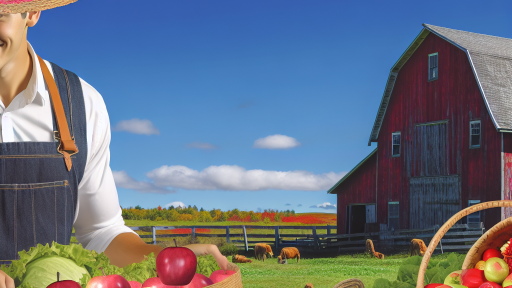Introduction to Agri-Tourism
Definition of Agri-Tourism
Agri-tourism combines agriculture and tourism.
It allows visitors to experience farm life firsthand.
Many farms offer tours, activities, and accommodations.
This sector helps farms diversify their income streams.
Benefits of Agri-Tourism
Agri-tourism provides numerous benefits to farmers and communities.
It creates additional revenue sources for farms.
Farmers can showcase their products to visitors.
In turn, this fosters community engagement and support.
Economic Impact
Agri-tourism boosts local economies significantly.
Visitors spend money on goods, food, and activities.
This spending creates jobs and stimulates growth.
Cultural Exchange
Agri-tourism promotes cultural understanding.
It allows visitors to learn about farming traditions.
This can enhance appreciation for agriculture and rural life.
Environmental Awareness
Participating in agri-tourism raises awareness of environmental issues.
Transform Your Agribusiness
Unlock your farm's potential with expert advice tailored to your needs. Get actionable steps that drive real results.
Get StartedVisitors gain insights into sustainable farming practices.
This knowledge encourages responsible consumption and support.
Opportunities for Local Farmers
All in all, agri-tourism presents unique opportunities.
It benefits farmers as well as the surrounding community.
Using agri-tourism strategies can invigorate local agriculture.
Identifying Target Markets for Agri-Tourism Opportunities
Understanding Your Audience
Identifying your target market is essential for successful agri-tourism.
Different groups seek unique experiences on farms.
Therefore, it’s crucial to understand the demographics of your potential visitors.
Families and Children
Families often seek educational activities for their children.
Agricultural experiences offer hands-on learning opportunities.
Activities like pumpkin picking and petting zoos attract this group.
Moreover, hands-on workshops can lead to repeat visits.
Young Adults and Millennials
Young adults are highly interested in sustainable practices and local foods.
This demographic values experiences over material possessions.
They prefer farm-to-table dining and interactive workshops.
Offer unique events such as craft cocktail nights or farm dinners.
Tourists and Travelers
Tourists are always looking for unique experiences during their travels.
Agri-tourism appeals to those looking for authentic local culture.
Partnerships with local hotels can help promote your events.
Consider offering guided tours that highlight farm history and operations.
Schools and Educational Institutions
Schools often seek field trip opportunities for students.
Educational trips to farms can teach children about agriculture and nature.
Developing programs that align with school curriculums can be beneficial.
Additionally, consider offering discounts for large school groups.
Showcase Your Farming Business
Publish your professional farming services profile on our blog for a one-time fee of $200 and reach a dedicated audience of farmers and agribusiness owners.
Publish Your ProfileHealth-Conscious Consumers
Health-conscious individuals are looking for organic and fresh produce.
Showcasing your sustainable farming practices can attract this audience.
Offer farm tours focusing on the health benefits of your products.
Moreover, hosting farmer’s markets can drive interest in your crops.
Local Community Engagement
Engaging with your local community can enhance your visibility.
Organize events that cater specifically to local residents.
Farmers’ markets or community potlucks can foster strong relationships.
Creating a loyalty program can encourage repeat visits from locals.
Leveraging Social Media for Market Identification
Social media platforms are valuable tools for identifying target markets.
They allow you to interact directly with potential visitors.
Additionally, consider using surveys to gather feedback from followers.
This data can help refine your offerings based on visitor interests.
Assessing Market Trends
Stay informed about trends in agri-tourism to adapt your strategy.
Researching popular activities in similar locations can provide insights.
Utilizing data analytics tools can help track visitor preferences.
Be flexible and ready to evolve your offerings based on market demands.
Creating Unique Experiences
Farm Tours
Farm tours offer visitors firsthand knowledge about agriculture.
They allow guests to explore the beauty of your farm.
During tours, highlight the unique crops and animals you grow.
Engage guests by providing storytelling about your farm’s history.
Additionally, consider offering seasonal tours to showcase changes.
Workshops
Workshops can educate visitors about farming techniques.
Invite local experts to lead these interactive events.
Popular topics include organic gardening and sustainable farming.
Participants appreciate hands-on learning experiences.
Offer workshops for families to make it a fun outing.
Events
Host events to attract larger crowds to your farm.
Consider organizing seasonal festivals or harvest days.
These events foster community engagement and joy.
Include local food vendors to create a lively atmosphere.
Market these events through social media to widen your reach.
Explore Further: Building a Direct-to-Consumer Farm Sales Strategy
Leveraging Social Media and Online Marketing for Promotion
Defining Your Brand Online
Start by establishing a clear brand identity for your farm.
Your branding should reflect your farm’s values and uniqueness.
Use consistent visuals and messaging across all platforms.
This will help create a recognizable presence in the market.
Selecting the Right Platforms
Identify the social media platforms most frequented by your target audience.
Facebook is great for community engagement and event promotion.
Instagram excels at showcasing visually appealing aspects of farming.
Twitter can be useful for real-time updates and news sharing.
Showcase Your Farming Business
Publish your professional farming services profile on our blog for a one-time fee of $200 and reach a dedicated audience of farmers and agribusiness owners.
Publish Your ProfileCreating Engaging Content
Share high-quality photos and videos to captivate your audience.
Highlight daily life on the farm and behind-the-scenes activities.
Offer educational content about farming practices and agri-tourism events.
Host live Q&A sessions to interact directly with your audience.
Utilizing Influencer Partnerships
Collaborate with local influencers to broaden your reach.
Choose influencers who align with your farm’s values and mission.
Have them visit your farm and share their experiences with followers.
This creates authentic content that resonates with potential visitors.
Implementing Targeted Advertising
Use social media advertising to target specific demographics.
Craft ads that showcase your unique offerings and upcoming events.
Analyze the performance of your ads to optimize future campaigns.
This will help you reach a larger audience effectively.
Engaging with Your Community
Respond promptly to comments and messages on your social channels.
This shows that you value customer interaction and feedback.
Share user-generated content to foster a sense of community.
Encourage visitors to tag your farm in their posts and stories.
Utilizing a Strong Email Marketing Strategy
Build an email list to stay connected with your audience.
Send regular newsletters featuring farm updates and offers.
Include personalized content to make your subscribers feel valued.
This strengthens relationships and encourages repeat visits.
Monitoring and Evaluating Your Strategy
Track the performance of all your online marketing efforts.
Use analytics tools to understand what content resonates the most.
Adjust your strategies based on these insights for better results.
Continuously refine your approach to maximize reach and engagement.
You Might Also Like: The Farmer’s Role in the Farm-to-School Movement
Collaboration with Local Businesses and Tourism Boards
Building Partnerships
Collaborating with local businesses enhances your farm’s visibility.
Such partnerships can create unique experiences for visitors.
Engage nearby restaurants to feature your farm products.
For example, local cafes can use your fresh produce in their dishes.
Consider teaming up with hotels to offer special packages.
These packages might include farm tours or activities.
In addition, sporting events can attract tourists to your area.
Creating a cooperative marketing strategy can be very beneficial.
Engaging Tourism Boards
Tourism boards can play a key role in promoting your farm.
Connect with them to include your farm in local tourism brochures.
Attend tourism meetings to present your unique offerings.
They can help advertise your events on their platforms.
Utilizing social media can also expand your outreach.
Join local tourism events to network and showcase your farm.
Cross-Promotional Opportunities
Explore cross-promotional opportunities with other attractions.
Showcase Your Farming Business
Publish your professional farming services profile on our blog for a one-time fee of $200 and reach a dedicated audience of farmers and agribusiness owners.
Publish Your ProfilePartner with nearby wineries for joint tastings or events.
Collaborate with art galleries for farm-themed exhibitions.
Consider creating a trail that connects multiple local businesses.
Such initiatives can keep visitors engaged longer.
This can enhance the overall visitor experience in your region.
Utilizing Local Resources
Many local resources can assist in your agri-tourism efforts.
Leverage local media to feature stories about your farm.
Share content that highlights unique experiences and products.
Participate in local festivals to promote your farm.
This can attract visitors who may not be aware of your offerings.
Networking with other farmers can also provide mutual benefits.
Sharing insights and experiences can strengthen community ties.
You Might Also Like: Sustainable Farming Through Local Food Sourcing

Implementing Sustainable Practices to Enhance Visitor Appeal
Understanding Sustainable Practices
Sustainable practices focus on preserving resources for future use.
They encourage responsible land management and environmental stewardship.
This approach attracts visitors who value eco-friendliness.
Benefits of Sustainable Practices
Sustainable farming provides numerous benefits for your farm.
First, it promotes biodiversity within the ecosystem.
Second, it improves soil health, which leads to better crop yields.
Moreover, it reduces the carbon footprint of your operations.
This, in turn, appeals to environmentally-conscious tourists.
Effective Strategies for Implementation
To implement sustainable practices, start by using organic fertilizers.
Additionally, consider crop rotation to maintain soil nutrients.
Integrate water conservation techniques to manage resources wisely.
Furthermore, promote the use of renewable energy sources on the farm.
Marketing Your Sustainable Efforts
Communicate your sustainable practices through various channels.
Create engaging content on social media to showcase your initiatives.
Use signage on the farm to educate visitors about sustainability.
Collaborate with local eco-friendly organizations for joint promotions.
Engaging Visitors with Sustainable Experiences
Host workshops to teach visitors about sustainable farming techniques.
Offer guided tours that highlight your sustainable practices.
Encourage visitors to participate in hands-on activities on the farm.
Provide informational materials that detail your farm’s sustainability efforts.
Gain More Insights: Customer Engagement in Direct-to-Consumer Farming
Regulations and Liability Considerations for Agri-Tourism
Understanding Local Regulations
Before you start agri-tourism, know your local regulations.
Each state may have different rules for agri-tourism activities.
Contact your local agricultural department for guidance.
They can provide information on necessary permits and licenses.
Additionally, consider zoning laws that may affect your farm.
Safety Standards and Compliance
Ensuring safety is critical for any agri-tourism venture.
Showcase Your Farming Business
Publish your professional farming services profile on our blog for a one-time fee of $200 and reach a dedicated audience of farmers and agribusiness owners.
Publish Your ProfileRegular safety inspections help maintain compliance with health codes.
Develop clear health and safety protocols for visitors.
Include signage to inform guests of potential hazards on your farm.
Insurance Considerations
Obtaining the right insurance is essential for liability coverage.
Consider general liability insurance to protect against accidents.
Consult with an insurance agent who specializes in farm insurance.
Understand what your policy covers and any exclusions it may have.
Waivers and Liability Releases
Creating waivers can help mitigate risk on your farm.
Waivers inform visitors about inherent risks associated with agri-tourism.
Ensure waivers are clear and signed by all participants.
Consult a legal professional to draft effective liability releases.
Health and Safety Regulations
Stay informed about health regulations applicable to your activities.
Ensure compliance with food safety standards if offering food products.
Implement emergency procedures in case of accidents or emergencies.
Impact of Non-Compliance
Failure to comply with regulations can lead to serious consequences.
Consequences may include fines, lawsuits, or loss of permits.
Stay proactive by regularly reviewing your compliance status.
Engage with local agricultural groups for updates on regulations.
Measuring Success: Analyzing Visitor Feedback and Business Growth
Understanding Visitor Feedback
Visitor feedback provides valuable insights into your agri-tourism efforts.
Gather this feedback through surveys and comment cards.
Direct conversations with visitors can also yield essential information.
Be sure to ask specific questions about their experiences.
For example, inquire about activities they enjoyed the most.
This approach helps you identify strengths and areas for improvement.
Utilizing Feedback for Improvement
Once you collect feedback, analyze the results critically.
Look for common themes in visitor comments.
Use this information to enhance your offerings.
Make adjustments to activities, facilities, or services if needed.
Consider implementing suggestions directly from your visitors.
Tracking Business Growth
Evaluating business growth is crucial for long-term success.
Track key performance metrics regularly.
These metrics include visitor numbers, revenue, and customer retention.
Compare this data against previous years to gauge growth.
Set specific goals based on this data for future planning.
Aligning Feedback with Growth Metrics
Connecting visitor feedback to business growth metrics provides clarity.
For instance, track whether increased visitor satisfaction correlates with higher sales.
Identify which activities drive both feedback and revenue growth.
This alignment helps you focus resources on the most successful areas.
Adapting Marketing Strategies
Finally, adapt your marketing strategies based on visitor insights.
Highlight popular features in marketing materials.
Showcase Your Farming Business
Publish your professional farming services profile on our blog for a one-time fee of $200 and reach a dedicated audience of farmers and agribusiness owners.
Publish Your ProfileUtilize social media to share positive visitor experiences.
Acknowledge feedback in your promotions to engage potential visitors.
Creating a positive feedback loop fosters continuous improvement.
Additional Resources
Local Food Systems: Concepts, Impacts, and Issues, ERR 97, US …




